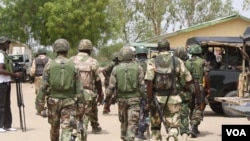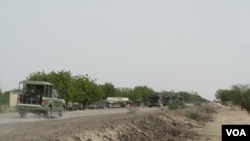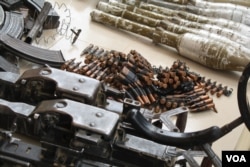ABUJA —
A Nigerian committee set up to negotiate with insurgent group Boko Haram is calling for Islamic leaders to help bridge the gap between the government and militants. But Islamic leaders say Boko Haram violence is unfairly associated with the Muslim religion.
On April 24, Nigerian President Goodluck Jonathan formally set his “Amnesty Committee” to work. Their job was to find a way to negotiate with Boko Haram, a militant group that has killed thousands since it began violent operations in 2009.
Less than three weeks later, the president said Boko Haram had captured territory and declared emergency rule in three northeastern states, Borno, Yobe and Adamawa, and sent thousands of troops to fight the group.
At a conference in the northern city of Kaduna on Sunday, Amnesty Committee Chair Kabiru Tanimu Turaki said since then, committee members have met with local governments and traditional leaders. They have also tried to encourage Boko Haram members to come forward by releasing women and children in jail for Boko Haram-related crimes.
Boko Haram, he said, has not been all that receptive.
"We are coming from the background where initially they said they do not want amnesty," he said. "They should be the ones to give amnesty. Again their chairman said they are not willing to enter into dialogue with any other person. We have to find a way of talking to them. We have to find a way of engaging them.”
The way to engage Boko Haram, he said, could be through the clergy.
He called Boko Haram ideology, which includes a harsh interpretation of Islamic law, “misguided,” but nevertheless related to Islam. Speaking to hundreds of Islamic leaders at the conference, he asked them to convince Boko Haram leaders that negotiations are necessary and in accordance with Islam.
“We are pleading with you in the interest of peace to call on these people. Let them give peace a chance. Let them allow for dialogue,” he said.
Financial compensation
Turaki also responded to calls for financial compensation for Boko Haram victims, saying it is not going to happen.
“The government will not have capacity to be able to give compensation to all those who have been affected," he said. "If you consider in places like Borno, in places like Yobe, virtually everybody, virtually every family are victims. So how do you compensate them?”
Islamic leaders did not respond publicly to the committee’s request for help, and they asked reporters to leave while they discussed it.
But in a speech earlier Sunday, Nigeria’s leading Muslim cleric, Sultan of Sokoto Muhammed Sa'adu Abubakar, stressed criminal acts are not religious acts, just because criminals claim them to be so.
“Whenever any violence takes place anywhere in the world, if it is committed by a Muslim, you hear ‘Islamic terrorist’ or ‘Muslim terrorists’ or ‘Islamic fundamentalists," he said.
Crimes committed in the names of other religions, he added, are not nearly as often used to stigmatize the religion itself.
“But when worse violence was affected by somebody who is not a Muslim, we do not hear the same coinage or the same personalization of that criminal activity, linking it to that particular religion,” Abubakar said.
Critics say the concept of granting amnesty and financial support to militants is an unsustainable solution because it is essentially paying criminals not to commit crimes. Supporters of negotiations say there is a tentative peace in the oil-rich southern Niger Delta solely because the government offered amnesty and small salaries to tens of thousands of militants in 2009.
Meanwhile, Nigeria’s Human Rights Commission released a report warning that a “foreseeable humanitarian crisis” could threaten recent security gains, and saying both Boko Haram and security forces may be responsible for the violence. The commission says a farming season has been lost, thousands of people have been displaced and prices are skyrocketing.
But with the emergency zones almost entirely cut off from communications, the commission says it is hard for anybody to gauge exactly what is going on.
Ibrahima Yakubu contributed to this report from Kaduna.
On April 24, Nigerian President Goodluck Jonathan formally set his “Amnesty Committee” to work. Their job was to find a way to negotiate with Boko Haram, a militant group that has killed thousands since it began violent operations in 2009.
Less than three weeks later, the president said Boko Haram had captured territory and declared emergency rule in three northeastern states, Borno, Yobe and Adamawa, and sent thousands of troops to fight the group.
At a conference in the northern city of Kaduna on Sunday, Amnesty Committee Chair Kabiru Tanimu Turaki said since then, committee members have met with local governments and traditional leaders. They have also tried to encourage Boko Haram members to come forward by releasing women and children in jail for Boko Haram-related crimes.
Boko Haram, he said, has not been all that receptive.
"We are coming from the background where initially they said they do not want amnesty," he said. "They should be the ones to give amnesty. Again their chairman said they are not willing to enter into dialogue with any other person. We have to find a way of talking to them. We have to find a way of engaging them.”
The way to engage Boko Haram, he said, could be through the clergy.
He called Boko Haram ideology, which includes a harsh interpretation of Islamic law, “misguided,” but nevertheless related to Islam. Speaking to hundreds of Islamic leaders at the conference, he asked them to convince Boko Haram leaders that negotiations are necessary and in accordance with Islam.
“We are pleading with you in the interest of peace to call on these people. Let them give peace a chance. Let them allow for dialogue,” he said.
Financial compensation
Turaki also responded to calls for financial compensation for Boko Haram victims, saying it is not going to happen.
“The government will not have capacity to be able to give compensation to all those who have been affected," he said. "If you consider in places like Borno, in places like Yobe, virtually everybody, virtually every family are victims. So how do you compensate them?”
Islamic leaders did not respond publicly to the committee’s request for help, and they asked reporters to leave while they discussed it.
But in a speech earlier Sunday, Nigeria’s leading Muslim cleric, Sultan of Sokoto Muhammed Sa'adu Abubakar, stressed criminal acts are not religious acts, just because criminals claim them to be so.
“Whenever any violence takes place anywhere in the world, if it is committed by a Muslim, you hear ‘Islamic terrorist’ or ‘Muslim terrorists’ or ‘Islamic fundamentalists," he said.
Crimes committed in the names of other religions, he added, are not nearly as often used to stigmatize the religion itself.
“But when worse violence was affected by somebody who is not a Muslim, we do not hear the same coinage or the same personalization of that criminal activity, linking it to that particular religion,” Abubakar said.
Critics say the concept of granting amnesty and financial support to militants is an unsustainable solution because it is essentially paying criminals not to commit crimes. Supporters of negotiations say there is a tentative peace in the oil-rich southern Niger Delta solely because the government offered amnesty and small salaries to tens of thousands of militants in 2009.
Meanwhile, Nigeria’s Human Rights Commission released a report warning that a “foreseeable humanitarian crisis” could threaten recent security gains, and saying both Boko Haram and security forces may be responsible for the violence. The commission says a farming season has been lost, thousands of people have been displaced and prices are skyrocketing.
But with the emergency zones almost entirely cut off from communications, the commission says it is hard for anybody to gauge exactly what is going on.
Ibrahima Yakubu contributed to this report from Kaduna.







